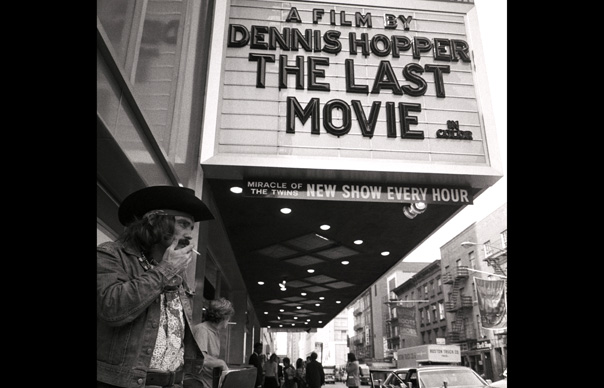Dennis Hopper would have been 78 tomorrow (May 17). That seemed like a good reason to dust down this piece I wrote on the making of The Last Movie, Hopper's legendarily unhinged follow-up to Easy Rider. The piece originally appeared in Uncut issue 158, as part of a survey we ran on the 50 Greatest ...
The Last Movie finally made its debut at the ’71 Venice Film Festival in August, where it won the Best Film award, before Universal released it in America on September 29, ’71 at New York’s RKO 59th St Twin Theater; the same cinema in which Easy Rider had made its debut. Although the film broke the single day box office record, the critical response was overwhelmingly negative. The New York Times review, for instance, described it as “an extravagant mess… indulgent, cruel and thoughtless.” Universal were horrified, and demanded Hopper recut it. He refused, and The Last Movie was withdrawn within two weeks of its release.
“It died a quick death,” Hopper told Uncut. “My career never recovered. It was another 10 years before I had a chance to direct again.”
In 1987, Hopper and Stern had dinner together during a retrospective of Hopper’s work at the Seattle Film Festival. They discussed the idea of remaking The Last Movie, with Hopper directing a younger actor, and this time using the original shooting script, but Hopper became too busy with other projects. The Last Movie enjoyed a brief US video release in March, 1993, before disappearing again, although there have been several promising rumours about a DVD issue. In a 2006 interview in Playboy, Hopper claimed he had acquired the rights from Universal and was planning to release it, while prestige reissue label the Criterion Collection also investigated the possibility of issuing a Special Edition DVD, but nothing ever came of it.
Today, it seems likely the only opportunity to see The Last Movie is at film festivals, where it often screens alongside The American Dreamer. With Hopper’s health sadly in decline – he was diagnosed with prostate cancer on October 29, 2009 – it’s inevitably hard to predict what the future might hold for the film. Written off by many at the time as an unmitigated disaster, The Last Movie viewed today is a frequently dazzling experience. Certainly, no other studio film from that period was as formally challenging. The movie’s film within a film-within-a-film conceit – with Hopper coming in and out of character as Kansas – and its ongoing commentary on the filmmaking process finds a more resonant echo in the work of Charlie Kaufman. Alex Cox’s 1987 film, Walker – about the 19th century American adventurer William Walker, who invaded Nicaragua in the 1850s – likewise adopted a non-traditional approach to filmmaking, including anachronisms like helicopters, and like Hopper, Cox was blacklisted as a director.
If anything, The Last Movie is almost overwhelmed by the number of ideas Hopper throws at you: it’s a Western, it’s a statement on American expansionism, it’s a satire on Hollywood… To audiences looking forward to more of the stoner hijinks of Easy Rider, it’s no wonder The Last Movie left them confused; this was a far more audacious film than anyone could have anticipated. Arguably, The Last Movie sums up the artist Hopper wanted to be: bold, out-there, taking risks. “It’s a very personal film of Dennis’s,” agrees Dean Stockwell. “It had some brilliant moments in it, and some brilliant vignette performances,” says Stewart Stern. “You couldn’t dismiss it, just the pageantry that he caught on film was so remarkable, so gorgeous. You have to account for that and give Dennis supreme credit for it.”
“Right or wrong,” Hopper told Uncut, “that’s what I wanted to do.”
Photo: © Bettmann/CORBIS



